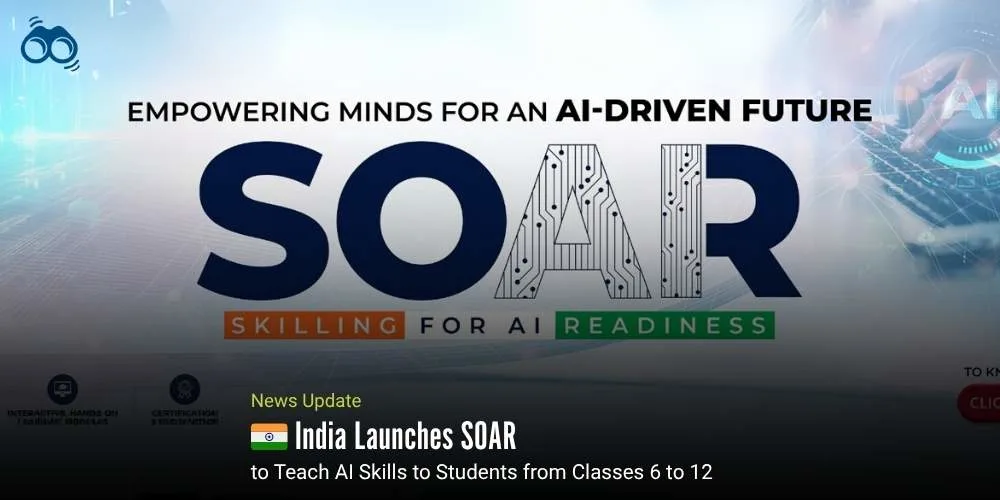Teachers to Receive AI Training as Part of National Skilling Initiative
SOAR Empowers Young Learners with Future-Ready AI Skills
In a major stride towards embedding emerging technologies into early education, the Minister of State for Skill Development and Entrepreneurship, Jayant Chaudhary, launched SOAR (Skilling for AI Readiness) on 22 July. This national initiative is designed to foster artificial intelligence (AI) awareness and develop foundational skills among school students from Classes 6 to 12, thereby equipping them for future opportunities in the digital economy.
The programme comprises three progressive 15-hour modules for students: AI to be Aware, AI to Acquire, and AI to Aspire, each intended to deepen their understanding of AI concepts and applications in a structured manner. Additionally, a 45-hour module titled AI for Educators has been introduced to empower teachers with the necessary tools and knowledge to deliver AI instruction effectively. Speaking at the launch event in New Delhi, Mr Chaudhary stated that India aspires to build the world’s largest network of young learners engaging with AI. He emphasised that the initiative prioritises real-world application over theoretical learning and described it as a pivotal step towards creating a tech-driven, future-ready nation. He further reaffirmed the government’s long-term development vision under Viksit Bharat 2047, highlighting the central role of skilling in national progress.
The programme is reported to include modules on AI fundamentals, generative AI, ethical technology use, cybersecurity, and career pathways, offering a comprehensive foundation for digital literacy. In parallel, the Ministry of Skill Development and Entrepreneurship (MSDE) launched KaushalVerse, a digital portal developed by NCVET, aimed at streamlining vocational training regulations and enhancing access to skill-related services. A key highlight of the event was the launch of India’s first and the world’s largest outcomes-based development impact bond for skilling and employment, known as the Skill Impact Bond (SIB). Led by MSDE through the National Skill Development Corporation (NSDC), the SIB has mobilised $14.4 million and seeks to align skilling efforts more directly with employment outcomes.
Furthermore, several Memoranda of Understanding (MoUs) were signed to strengthen public-private and international partnerships in skill development. Notably, an agreement with the Government of the French Republic focuses on vocational education, joint curriculum development, the establishment of Centres of Excellence, and cross-country training models. Under the PMKVY 4.0 institutional training initiatives, various institutes are undertaking targeted skilling programmes. IIIT Una is set to train 120 candidates in Electrical Technician and Software Programming roles, with a focus on deep-tech and IT-ITeS sectors. Similarly, IIT Hyderabad will train 280 candidates in Sangareddy, Telangana, across sectors such as Electronics, Hydrocarbon, and Capital Goods, preparing them for roles including CNC Programmer and AI–ML Engineer. In Patna, Bihar, IIT Patna will train approximately 1,440 candidates in areas including agriculture, green jobs, and healthcare, for roles such as EV Service Technician, AR/VR Engineer, and Elderly Caretaker.
In addition, NIT Agartala is reportedly training 370 candidates in West Tripura in fields such as Automotive IoT, Bamboo Work Artisan, and AI–Data Science, blending traditional skills with modern technologies. In Gandhinagar, Gujarat, Rashtriya Raksha University (RRU) is expected to train 240 candidates for roles including Yoga Wellness Trainer and Fire Safety Officer, integrating digital competencies with wellness-focused training to meet evolving workforce demands.
Moreover, NSTI Mumbai has reportedly signed an MoU with the ICICI Foundation to promote rural incubation and entrepreneurship, supporting vocational and project-based training for rural communities. A series of Flexi MoUs were also signed under the PMKVY institutional strengthening strategy with companies such as Dixon Technologies, Microsoft, and HCL, aimed at customising vocational programmes to better reflect current industry requirements and enhance trainee employability. These initiatives collectively reflect a strategic national effort to integrate technology, industry relevance, and inclusive skilling into India’s education and workforce development landscape.
Editor’s Note:
The launch of SOAR (Skilling for AI Readiness) by the Ministry of Skill Development and Entrepreneurship is an important step in preparing India’s young people for the future. By bringing basic AI education into schools for students from Classes 6 to 12, and creating a special module for teachers, the government is showing its commitment to building a tech-savvy generation ready for the digital age. While artificial intelligence is changing how we live and work, many students, especially those in smaller towns and villages, have little or no access to learning about it. This programme aims to change that. It fits into the larger national goal of building a developed India by 2047, where skill development plays a key role. SOAR's timely focus on real-life AI, ethics, and future careers is crucial as India leads digital innovation. Linking skill training to job opportunities through tools like the Skill Impact Bond and global partnerships is essential. SOAR's success hinges on effective implementation, ensuring all students, especially in remote areas, benefit. Strong cooperation among government, schools, and industry is vital.
Skoobuzz sees SOAR as a wise investment in India's human capital. Through collaborative effort and appropriate backing, SOAR has the potential to foster a more skilled, confident, and inclusive future.














0 Comments (Please Login To Continue)